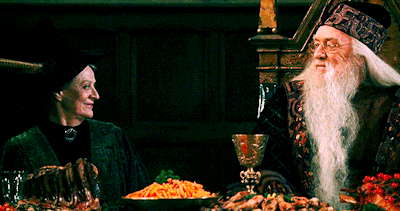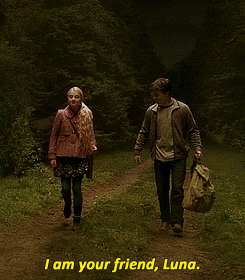The “Harry Potter” Series Isn’t All About the Ships – And I’m Okay with That
As someone who identifies as asexual, I can safely say that it is difficult finding representation in literature. Most novels are full of romance and plenty of steamy scenes. I feel that an overabundance of novels perpetuates the stereotype that a happy ending is equal to marriage and kids. What I’ve always loved about the Harry Potter books is that there’s a healthy balance of romantic and platonic relationships. For example, it’s my personal opinion that Professor McGonagall has one of the best lives of any of the characters. She’s single and independent, and she still lives an exciting life. When my friends were reading the Harry Potter series, they were convinced McGonagall and Dumbledore would get married at the end of the series, and that would be their happily ever after. While this didn’t happen for obvious reasons, I think their endings happened just the way they were supposed to. Instead, McGonagall and Dumbledore enjoyed a healthy and rewarding platonic friendship throughout their years together at Hogwarts.
Speaking of single characters in the Harry Potter series, I love that there are plenty of secondary characters who are unmarried as well and who still live fulfilling lives. Another great example of a single character, one whom most fans have theorized is asexual, is Charlie Weasley. Unlike his siblings, Charlie never gets married. Instead, he works successfully as a dragonologist in Romania. If this isn’t cool enough, his parents totally respect his life choices, and no one treats Charlie any differently. I’ll never forget how Charlie saved the day with baby dragon Norberta either. Even though Charlie doesn’t live a conventional life, his character is just as valid and important as any other in the Potter canon.
What I love about the Harry Potter fandom is that, even when we may have opposing ideas on which couples work best together, we still want the characters to be happy. For example, no matter who we ship with Harry, what matters most is the strong friendship of the golden trio. Don’t get me wrong – I love Ron and Hermione’s romance, but even that relationship is built on a strong friendship. I think it’s so realistic that it took them years to get together since most friends don’t want to risk the great platonic relationship they have going for them already. It actually paid off in the end that the pair became such best friends because it made their romance more solid and lasting.
Going back to the golden trio, one of my favorite relationships in the Harry Potter books is Harry and Hermione’s friendship. While fans may disagree on whether this pair should have ended up together, what is evident is their respect for one another. The main reason this relationship is so important is that it’s a stellar example of healthy male and female friendships. It’s my belief that perpetuating the stereotype that guys and girls can’t be friends is another way of saying that guys don’t have the emotional intelligence and capacity to “just be friends.” However, having examples of friendships like Harry and Hermione’s in literature demonstrates that both men and women can be vulnerable, and that’s okay.
For example, there’s the movie scene in Harry Potter and the Half-Blood Prince when Harry comforts Hermione after she’s heartbroken over Ron dating someone else. Instead of making fun of her or making an inappropriate pass at her, Harry is a shoulder to cry on. Another amazing example is when Harry is screaming about finding out Sirius is his godfather in the film Harry Potter and the Prisoner of Azkaban. Instead of telling him to bottle up his emotions, Hermione calmly asks Harry why he’s upset, and she sits with him while he lets out his anger. As someone who has had more supportive male friendships than female ones, I think such friendships are vastly underrated.
The Harry Potter series is special to me because it’s one of the only book series that shows supportive male friendships and platonic relationships, all while avoiding the trope of toxic masculinity. While I agree that there could always be more diversity and representation in literature, I think the Harry Potter books are a fantastic start. I feel seen in empowered female characters, such as Hermione, Ginny, and Professor McGonagall. I don’t want to marry Ron Weasley, but that doesn’t mean I still can’t benefit from Hermione’s groundbreaking feminist character arc.







